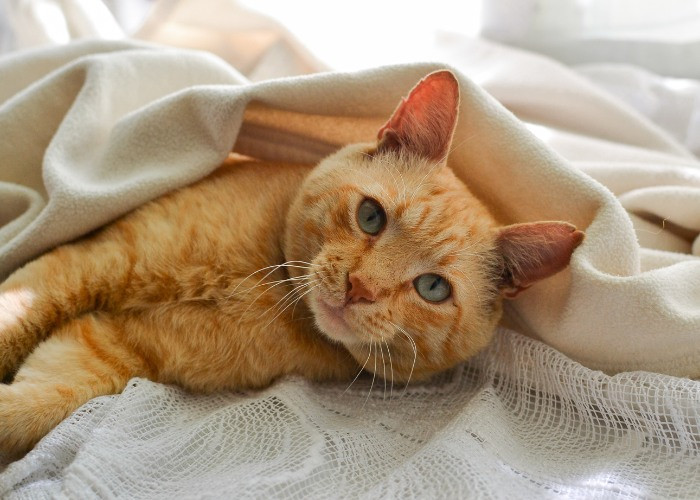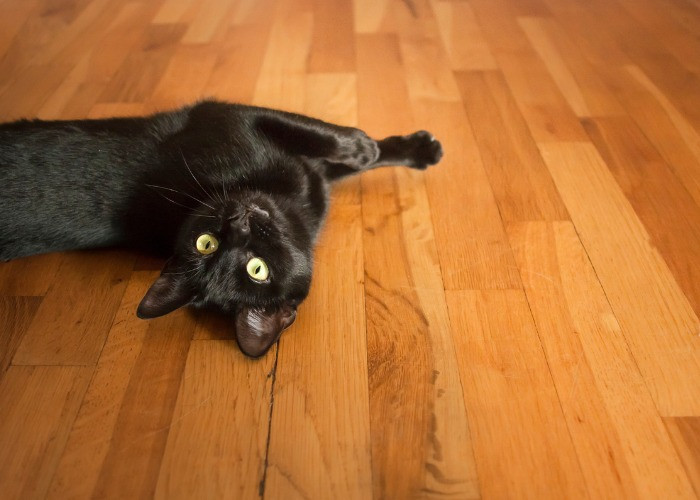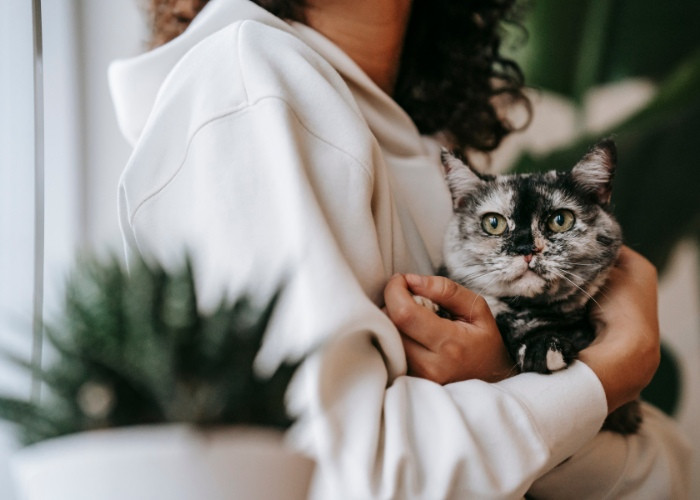Do Cats Know When You Are Sick? Yes, cats possess an incredible sense of smell and observation skills that allow them to detect changes in your scent, behavior, and physical symptoms, potentially indicating illness. Solcat.net explores this fascinating topic, delving into feline behavior and the connection between cats and their owners, offering insights into how these sensitive creatures perceive our well-being. Understanding how cats perceive your health can strengthen your bond and improve their care, ensuring a happy and harmonious life together.
1. Can Cats Actually Sense When You’re Not Feeling Well?
Yes, cats can sense when you are not feeling well. Their heightened senses, particularly their sense of smell, combined with their ability to observe changes in your behavior and routine, equip them to perceive when something is amiss with your health. This allows them to offer companionship, support, and adjust their behavior accordingly.
Cats have an extraordinary sense of smell, far surpassing that of humans. This allows them to detect subtle changes in your body odor, which can be indicative of hormonal imbalances or the presence of illness. For example, when you have a cold, your cat may detect the scent of cough drops or the change in your natural body odor due to hormonal fluctuations. Furthermore, cats are keen observers of human behavior. They quickly pick up on changes in your routine, such as staying in bed longer than usual or not getting up with your alarm. They also notice physical symptoms like coughing, sneezing, or changes in your heart rate.
Combining their keen sense of smell with their observational skills, cats can piece together clues that indicate you are not feeling well. While it’s unclear if they fully understand the concept of illness, their behavior often reflects a sense of concern or attentiveness. They may spend more time near you, offer cuddles, or simply keep a watchful eye. This behavior is likely driven by a combination of empathy, instinct, and their dependence on you for care.
2. How Do Cats Use Their Sense Of Smell To Detect Illness?
Cats use their highly developed sense of smell to detect subtle chemical changes in your body odor that signal illness. Their olfactory system is far more sensitive than humans, enabling them to identify hormonal changes and volatile organic compounds (VOCs) associated with various diseases.
A cat’s sense of smell is estimated to be 14 times stronger than a human’s. This heightened sensitivity allows them to detect tiny differences in scent that we would never notice. When you are sick, your body undergoes various physiological changes that can alter your body odor. These changes can include hormonal imbalances, the release of VOCs from infections, and changes in your metabolism.
For example, certain types of cancer can produce unique VOCs that are detectable by dogs, and there is anecdotal evidence suggesting that cats can also detect these scents. Additionally, hormonal changes associated with pregnancy, diabetes, and other conditions can also alter your body odor. Cats can also detect external scents associated with illness, such as cough drops, medications, or ointments. If you consistently use a particular product when you are sick, your cat may learn to associate that scent with your illness.
 Orange Cat Laying Down
Orange Cat Laying Down
Cats can detect subtle differences that make every human smell slightly different.
3. Can Cats Recognize Physical Symptoms Of Sickness In Humans?
Yes, cats can recognize physical symptoms of sickness in humans. Their sharp observation skills allow them to notice subtle changes in your appearance, behavior, and vital signs, such as rapid heart rate, coughing, sneezing, or changes in your body temperature.
Cats are highly attuned to their environment and the people they live with. They observe your daily routines, habits, and physical characteristics. When you are sick, your physical symptoms may deviate from your norm, and your cat will likely notice. For example, if you typically have a steady gait, a cat can notice a faltering step.
A rapid heart rate, often associated with fever or anxiety, can be detected by a cat who frequently snuggles on your chest. They may also notice changes in your breathing patterns, such as shallow or labored breathing. These subtle cues alert the cat that something is not right. Changes in your appearance, such as pale skin, sunken eyes, or weight loss, can also be noticed by a keen observer.
4. Do Cats Notice Behavioral Changes When Their Owners Are Sick?
Yes, cats do notice behavioral changes when their owners are sick. They are highly attuned to routines and patterns, so any deviation from the norm, such as changes in sleep habits, activity levels, or mood, will be readily observed by your feline companion.
Cats thrive on consistency and predictability. They learn your daily routines, including when you wake up, when you eat, when you leave for work, and when you engage in playtime. When you are sick, your routine inevitably changes. You may sleep in later, skip meals, or spend more time resting on the couch. These disruptions to the normal routine are easily noticed by your cat.
Cats also pay close attention to your mood and emotional state. They can sense when you are feeling down, stressed, or anxious. When you are sick, you may exhibit behaviors such as irritability, lethargy, or withdrawal. Your cat may respond by offering comfort, seeking attention, or simply staying close by your side.
 Cute Black Cat
Cute Black Cat
How a person behaves when they’re sick is potentially the most obvious way a cat clues into human feelings and well-being.
5. Are There Any Scientific Studies To Support The Idea That Cats Can Sense Illness?
While there is limited direct scientific evidence proving that cats can sense illness in humans, there are studies suggesting that animals, including dogs, can detect certain diseases through their sense of smell. This provides indirect support for the possibility that cats may possess a similar ability.
Several studies have shown that dogs can be trained to detect various types of cancer, including lung cancer, breast cancer, and prostate cancer, through their sense of smell. These dogs are able to identify unique VOCs that are released by cancerous cells. Given that cats have a highly developed sense of smell, it is plausible that they could also be capable of detecting these VOCs.
The American Animal Hospital Association (AAHA) acknowledges the remarkable sensory capabilities of animals, including cats, and notes that anecdotal evidence suggests they may be able to detect changes in their owners’ health. However, they emphasize that more research is needed to confirm these claims scientifically.
6. How Does A Cat’s Behavior Change When It Senses That Its Owner Is Sick?
When a cat senses that its owner is sick, its behavior may change in several ways. Some cats become more affectionate and clingy, while others may become more aloof and withdrawn. These changes are often subtle and can be easily missed if you’re not paying close attention.
Affectionate Behaviors: Some cats may become more affectionate and clingy when their owners are sick. They may spend more time cuddling, purring, and rubbing against you. They may also follow you around the house and try to stay close by your side. This behavior is likely driven by a combination of empathy, concern, and a desire to comfort you.
Aloof Behaviors: Other cats may become more aloof and withdrawn when their owners are sick. They may spend more time hiding, sleeping, or avoiding contact with you. This behavior may be due to stress, anxiety, or a feeling of being overwhelmed. It’s important to respect your cat’s space and allow them to come to you when they’re ready.
Monitoring: The first thing a cat does is begin to monitor the situation. They are assessing all available information and will start to develop a routine.
 Woman Holding Cat
Woman Holding Cat
Because cats love routine, they are hyper-aware when something in their environment (including your behavior) is different.
7. Is It Possible That Cats Are Simply Responding To Changes In Routine?
Yes, it’s possible that cats are simply responding to changes in routine rather than directly sensing illness. Cats are creatures of habit and thrive on predictability, so any deviation from their normal schedule can cause them stress and anxiety.
Cats are highly sensitive to their environment and the people they live with. They learn your daily routines, including when you wake up, when you eat, when you leave for work, and when you engage in playtime. When you are sick, your routine inevitably changes. You may sleep in later, skip meals, or spend more time resting on the couch. These disruptions to the normal routine can trigger behavioral changes in your cat.
For example, if you normally feed your cat at 7 am, but you sleep in until 10 am when you are sick, your cat may become anxious and start meowing or scratching at the door. Similarly, if you normally spend an hour playing with your cat in the evening, but you are too tired to play when you are sick, your cat may become bored and restless.
8. How Can I Tell If My Cat Is Trying To Comfort Me When I’m Sick?
It can be difficult to determine whether your cat is intentionally trying to comfort you when you’re sick, as their behavior can be interpreted in different ways. However, there are some signs that suggest your cat is trying to offer support and affection.
Increased Affection: If your cat is normally independent but becomes more affectionate when you’re sick, it’s a good sign that they’re trying to comfort you. They may spend more time cuddling, purring, and rubbing against you.
Staying Close: If your cat follows you around the house and tries to stay close by your side, it suggests that they’re concerned about your well-being and want to offer their presence.
Gentle Behavior: If your cat is normally playful but becomes more gentle when you’re sick, it indicates that they’re aware of your vulnerability and are trying to be careful around you. They may avoid jumping on you or playing rough.
Purring: Purring is often associated with contentment and relaxation, but it can also be a sign of comfort and healing. If your cat purrs while cuddling with you when you’re sick, it’s possible that they’re trying to soothe you and help you feel better.
9. Should I Change How I Interact With My Cat When I’m Not Feeling Well?
When you’re not feeling well, it’s important to maintain a balance between caring for yourself and meeting your cat’s needs. While you may not be able to interact with your cat in the same way as when you’re healthy, there are some things you can do to ensure their well-being and provide them with the attention they need.
Maintain a Routine: Try to maintain as much of your cat’s normal routine as possible. This includes feeding them at their usual times, cleaning their litter box, and providing them with fresh water.
Provide Gentle Affection: Even if you’re not up for playing, you can still offer your cat gentle affection by petting them, cuddling with them, or simply talking to them in a soothing voice.
Respect Their Space: If your cat seems anxious or withdrawn, respect their space and allow them to come to you when they’re ready. Don’t force them to interact with you if they’re not comfortable.
Ask for Help: If you’re too sick to care for your cat properly, ask a friend, family member, or neighbor to help out. This will ensure that your cat’s needs are met and that they don’t feel neglected.
10. What Should I Do If I Notice A Sudden Change In My Cat’s Behavior?
If you notice a sudden change in your cat’s behavior, it’s important to take it seriously and investigate the cause. While it could be a sign that your cat is sensing your illness, it could also be a sign that your cat is sick or injured themselves.
Monitor Their Symptoms: Pay close attention to your cat’s symptoms and try to determine what might be causing the change in behavior. Are they eating and drinking normally? Are they using the litter box? Are they showing any signs of pain or discomfort?
Consult a Veterinarian: If you’re concerned about your cat’s health, consult a veterinarian as soon as possible. They can perform a physical exam and run tests to determine the cause of the problem and recommend appropriate treatment.
Provide a Safe and Comfortable Environment: Whether your cat is sensing your illness or experiencing health issues themselves, it’s important to provide them with a safe and comfortable environment. This includes providing them with a clean and comfortable place to sleep, fresh food and water, and plenty of attention and affection.
11. Can Cats Help With Healing Or Recovery?
While cats cannot directly cure illnesses, their presence and companionship can have a positive impact on your emotional and physical well-being, potentially aiding in healing and recovery.
Emotional Support: Cats can provide valuable emotional support during times of illness. Their calming presence, gentle purrs, and affectionate behavior can help reduce stress, anxiety, and loneliness. Studies have shown that pet owners tend to have lower blood pressure and heart rates, as well as lower levels of stress hormones like cortisol.
Motivation: Caring for a cat can provide a sense of purpose and motivation, even when you’re not feeling well. The responsibility of feeding, grooming, and playing with your cat can help you stay active and engaged, which can be beneficial for your physical and mental health.
Distraction: Spending time with your cat can provide a welcome distraction from your symptoms and worries. Playing with your cat, watching them sleep, or simply cuddling with them can help you relax and take your mind off your illness.
12. How To Create A Comfortable Environment For Your Cat When You Are Sick?
Creating a comfortable environment for your cat when you are sick ensures their needs are met while minimizing stress for both of you.
Keep Their Routine Consistent: Cats thrive on routine, so try to maintain their feeding, playtime, and cleaning schedules as much as possible. Even small disruptions can cause anxiety.
Provide a Quiet Space: If you need to rest, ensure your cat has a quiet and comfortable place to retreat to. This could be a cozy bed, a cat tree, or a secluded corner where they feel safe.
Maintain Hygiene: Keep their litter box clean to avoid any unpleasant odors that could bother you or your cat. Regular cleaning also prevents the spread of germs.
Offer Gentle Interaction: If you feel up to it, offer gentle petting or grooming. This can help reassure your cat and maintain your bond without overexerting yourself.
Ask for Assistance: If you are too sick to care for your cat properly, ask a friend, family member, or neighbor to help. Ensure they follow your cat’s routine to minimize disruption.
13. What Are Some Common Misconceptions About Cats And Their Ability To Sense Illness?
There are several misconceptions about cats and their ability to sense illness.
Cats Are Always Affectionate When You’re Sick: Some people believe that cats will always become more affectionate when you are sick. While some cats may become more clingy, others may become more withdrawn or exhibit no noticeable change in behavior.
Cats Can Diagnose Illnesses: It is a myth that cats can diagnose illnesses with certainty. While they may detect changes in your body, they cannot understand the underlying cause or provide a diagnosis.
Cats Are Only Acting Out Of Self-Interest: Some people believe that cats are only acting out of self-interest when they appear to be comforting you. While cats do have their own needs and desires, they are also capable of forming strong bonds with their owners and exhibiting empathy.
14. How To Enhance The Bond With Your Cat?
Enhancing the bond with your cat involves creating a loving, trusting, and stimulating environment. Here are some effective ways to strengthen your relationship with your feline companion.
Spend Quality Time Together: Set aside dedicated time each day to interact with your cat. This could involve playing, grooming, cuddling, or simply sitting nearby while you read or watch TV.
Learn Their Body Language: Understanding your cat’s body language can help you better interpret their needs and emotions. Pay attention to their posture, facial expressions, and vocalizations.
Provide Mental Stimulation: Keep your cat entertained and engaged with interactive toys, puzzle feeders, and scratching posts. Rotate their toys regularly to keep things interesting.
Create a Comfortable Environment: Make sure your cat has a comfortable and safe environment where they feel secure and loved. This includes providing them with a clean litter box, fresh food and water, and a cozy place to sleep.
15. Are There Any Specific Breeds Of Cats That Are Known To Be More Attuned To Human Emotions?
While individual cats within any breed can be highly attuned to human emotions, some breeds are generally known for their affectionate and empathetic nature.
Ragdoll: Ragdolls are known for their gentle and docile temperament. They are often described as being “dog-like” in their affection and loyalty.
Siamese: Siamese cats are highly intelligent and social. They are known for forming strong bonds with their owners and being very vocal about their needs and desires.
Persian: Persians are known for their sweet and gentle nature. They are often described as being calm and affectionate companions.
Maine Coon: Maine Coons are known for their friendly and outgoing personality. They are often described as being “gentle giants” who love to cuddle and play.
Seeking Reliable Cat Care Tips?
For trusted guidance on cat behavior, health, and care, visit solcat.net. Our articles offer expert advice, ensuring a happy and healthy life for your feline companion. Join our community of cat lovers in the USA and discover how to provide the best care possible. Whether you’re in Seattle or anywhere else in the US, we’re here to support you and your cat!
Address: 950 Alaskan Way, Seattle, WA 98104, United States
Phone: +1 (206) 386-4000
Website: solcat.net
FAQ About Cats Sensing Illness
1. Can cats sense when you’re pregnant?
Yes, cats can sense when you’re pregnant due to hormonal changes in your body odor.
2. Do cats know when you’re sad?
Yes, cats can often sense when you’re sad by recognizing changes in your behavior, such as altered routines or emotional cues.
3. Can cats detect cancer in humans?
While anecdotal evidence suggests cats might detect cancer through smell, scientific studies primarily focus on dogs’ ability to do so.
4. How do cats react when their owner is sick?
Cats may react by becoming more affectionate, staying close, or, conversely, becoming more withdrawn depending on their personality.
5. What physical symptoms can cats detect in sick humans?
Cats can notice changes in heart rate, breathing patterns, body temperature, and overall appearance, signaling sickness.
6. Is it possible that my cat is just reacting to changes in my routine?
Yes, changes in routine can significantly affect a cat’s behavior, making it seem like they sense your illness when they’re actually reacting to schedule disruptions.
7. Can purring from a cat help with healing?
Purring may offer a calming effect that can lower stress and promote relaxation, potentially aiding in the healing process.
8. Should I change my interactions with my cat when I’m sick?
Maintain your cat’s routine as much as possible and provide gentle affection, but respect their space if they seem anxious or withdrawn.
9. Are some cat breeds better at sensing human emotions?
Breeds like Ragdolls and Siamese are known for their sensitivity and empathetic nature, making them more attuned to human emotions.
10. How reliable is anecdotal evidence about cats sensing illness?
Anecdotal evidence provides insights, but it should be supplemented with scientific research for a comprehensive understanding.

